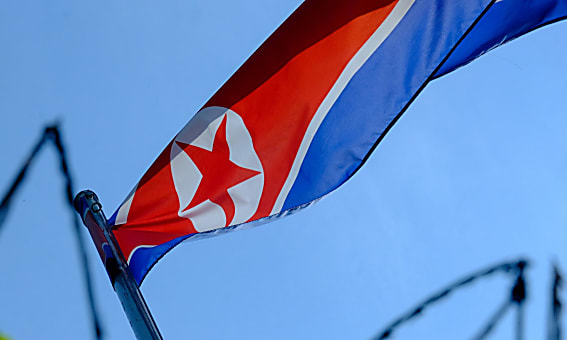
(Bloomberg) -- North Korea fired off two ballistic missiles, its second major test in less than a week of weapons designed to bolster its nuclear capability, prompting the United Nations Security Council to head into an emergency session hours later.
South Korea’s Joint Chiefs of Staff said two ballistic missiles were fired from central North Korea into waters off the eastern coast of the peninsula Wednesday afternoon.
North Korean state media on Thursday said the launches took place from trains, calling the first test-firing of a “railway borne missile system a success. The report said the missiles “accurately” struck targets in the eastern waters of Korea -- hours after Japanese Defense Minister Nobuo Kishi said they landed within Japanese waters.
The launches came on the same day South Korean President Moon Jae-in observed his military’s test of a submarine-launched ballistic missile, joining a small list of countries to demonstrate the technology.
The UN Security Council held an emergency meeting on North Korea after requests to do so from France and Estonia, according to a person familiar with the matter who asked not to be identified because the meeting hadn’t been publicly announced.
Japanese Prime Minister Yoshihide Suga called the North Korean launches an “outrage and a threat to the peace and safety of our country and the region.” Suga said “we protest strongly and condemn this action,” noting that Pyongyang is banned from tests of ballistic missiles under United Nations resolutions. U.S. State Department spokesman Ned Price condemned the North Korean launch, saying it violated Security Council resolutions.
But Price said the U.S. remains open to dialogue about the denuclearization of the Korean peninsula.
Moon convened a security meeting after the North Korean launches, the regime’s first since firing off two short-range rockets in March. The tests were the latest setback to Moon’s effort to get North Korea leader Kim Jong Un to open nuclear talks with U.S. President Joe Biden’s administration.
Kim Jong Un’s sister Kim Yo Jong issued a statement overnight condemning Moon’s comments on the latest launches and warning him to be careful about “every word and action used” to describe what North Korea claims the test as for “self-defense.”
The launches were among several security developments around the Korean Peninsula this week. Biden’s nuclear envoy held talks in Tokyo on Tuesday and China’s foreign minister visited Seoul on Wednesday.
The short-range ballistic missiles tested by North Korea on Wednesday were fired about five minutes apart from one another from Yangdok county, South Korea’s military said. They flew for about 800 kilometers (500 miles) and reached a maximum altitude of 60 km. The distance is one of the longest for this type of missile launched by the state and could take the rockets to western parts of Japan.
The launch comes days after North Korea said it fired off two new long-range cruise missiles. The missiles flew for about 1,500 kilometers on Saturday and Sunday, according to Pyongyang, meaning they would have a range to hit all of South Korea and almost all of Japan.
The U.S.’s nuclear envoy, Sung Kim, met with Japanese and South Korean counterparts Tuesday and said the door was open for North Korea to return to nuclear disarmament talks that have been stalled for about two years. The Biden administration has signaled it could offer incentives to help North Korea’s struggling economy in return for disarmament steps.
Kim Jong Un’s regime has been building up its capabilities to strike the U.S. mainland with nuclear warheads and deliver tactical strikes against South Korea and Japan, which host tens of thousands of American troops. His recent breakthroughs show that he pushed ahead with those efforts, even as he engaged in talks with former President Donald Trump.
Meanwhile, China’s foreign minister, Wang Yi, urged joint efforts to restore talks on North Korea’s nuclear program while visiting Seoul. During a meeting with South Korean Foreign Minister Chung Eui-yong earlier Wednesday, Wang played down the cruise missile test, noting that other countries had engaged in military exercises.
Pyongyang has touted efforts to build up its tactical strike capability, with Kim Jong Un telling a top ruling party meeting before Biden came to office in January that he was putting North Korea on a path to develop more advanced nuclear technologies and missiles. The plan included making smaller and lighter nuclear weapons and suggested a sweeping modernization of the country’s nuclear and conventional forces.
North Korea has also stepped up its ability to produce fissile material for warheads. The United Nations nuclear watchdog said North Korea had resumed from around July plutonium-producing operations at its Yongbyon nuclear facility.
“It appears that these moves are aimed at reminding the U.S. of the urgency of the North Korean nuclear issue,” said Rachel Minyoung Lee, a nonresident fellow with the 38 North Program at the Stimson Center. “North Korea has been entrenched in tackling domestic issues, but it also understands that ultimately it needs to improve relations with the U.S. for its various economic initiatives to succeed.”
More stories like this are available on bloomberg.com
©2021 Bloomberg L.P.